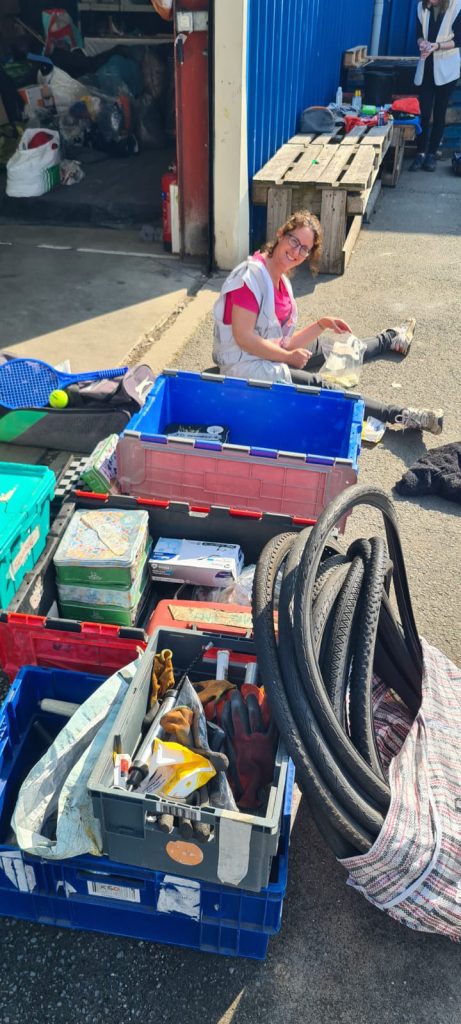ROSIE Watson travels to Calais as a volunteer with a charity supporting refugees.
Recently, I met a young man whose face and words are likely to remain with me for some time. But more of him later.
Some weeks previously, during an innocent coffee with a friend, we discussed where we are in our lives right now and some of the directions we might wish to take. This conversation resulted in an ultimately profound and moving experience – four days volunteering with a refugee charity in Calais.
We went as part of a small group on a trip organised by RefYouMe, but once there, were part of the dedicated and hardworking team of Care4Calais, a volunteer-run charity delivering essential aid and support to refugees in Northern France, Belgium and the UK.
Setting off in a car laden with donations from generous friends and neighbours, we arrived with a mixture of excitement and trepidation about what the next few days might hold. This was far out of our comfort zone, but we were keen to witness the behind-the-scenes operation of how such support and aid is managed and delivered.
The next morning saw us join a team of fellow volunteers – diverse ages, backgrounds and stories, but all with a desire to help, make even a small difference, let people know somebody cared. A full day was spent in two vast warehouses packed to the rafters with boxes and pallets containing so much that we take for granted, but which are so vital and appreciated by those who have so little. A strange atmosphere of industry, intent and focus, coupled with humour, music and coffee. Each of us was there for a different reason, but we all shared the value of what we were doing.
My main job that day was helping to bag up almost 500 packages containing a pair of socks, boxer shorts, a T-shirt and a sim card. I was struck by how basic such items are and how easily acquired – unless you have worn the same clothes for a month, when even a clean pair of socks takes on great significance.
The following two mornings were spent getting equipment and supplies cleaned, sorted and ready to take out on distributions in the afternoons. Again, all hands on deck – these hands are on deck day in, day out, without respite, to ensure that the communities they serve can access support as much as possible.
Going out to the distribution sites was an experience of profound respect – for those who help and for those who need help. There are no authorised settlements in Calais, no formal camps or facilities any more. Our first site was a tarmac strip on a field, which was lined on our arrival with about 150 young men waiting patiently for our van to arrive. Predominantly Sudanese, with some Afghans, Syrians, Eritreans and Iraqis, they received our packages with glee, many putting on their clean clothes instantly.
That first afternoon was spent serving countless hot drinks and biscuits to those who may not have had a hot drink in ages and may not know when they would get their next. So many were so young – 16, 17 years old – all without families, all having travelled over many countries and many months. Some rose to the normality of the chance to play football, charge phones, get their hair cut or their clothes mended and were the cheeky, buoyant teenagers they ought to be all the time. The older refugees could not hide their weariness and despair, the toll of months, even years, etched on their faces.
When our session finished for the day, a couple of hundred men simply vanished. Across the fields or into the hills, to become as invisible as they could. Some are lucky enough to have tents or tarpaulin that the authorities have not yet discovered and confiscated. Others have nothing, having previously left their tent to return to find they have been effectively evicted. They simply hide in the wilderness, melting away into the ether. This weekend was hot and sunny. It is not always like that.
The second afternoon was at a different site. It was a surreal experience indeed – sitting in the French sunshine in a car park, beside a canal, being soundly beaten at dominoes by Sudanese 17-year-olds. But it was also a chance to talk properly with some of them, hear their stories, learn of their journeys. I met a man whose home, land and business had all been taken from him in Syria. He had nothing left – not even hope. Mohammed, a delightfully polite and articulate 17-year-old Moroccan, wants to come to England and open a barber shop. Ahmet, who had left Iraq many years before, had made countless unsuccessful attempts to cross in a boat. He told me that last time, most ended up in the water. He had been sent back to France. He didn’t say what had happened to those in the water. And I couldn’t bear to ask.
And then the young man I mentioned at the start, the last I spoke to and the most heartbreaking. Nabil, from Syria, was totally alone. His ‘uncle’ (possibly not a genuine uncle), he thought, had got on to a boat the day before and Nabil was hoping to get on one the next day. His family were in Syria. He still wore braces on his teeth. Nabil is 13.
I have no political bias and went with little understanding, but I write this now with a deeply reflective sense of what is important, what we take for granted, and what wonderful people there are out there, trying so hard, against the odds, to make a small difference to people who just want an identity, a place of safety, and a better life.



